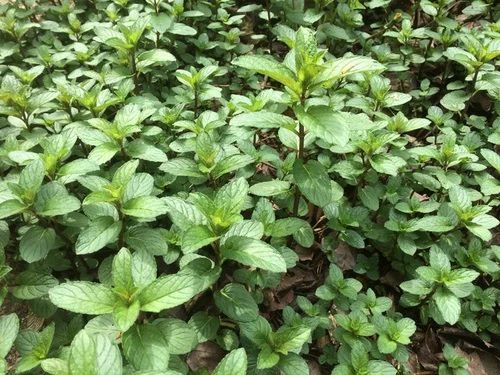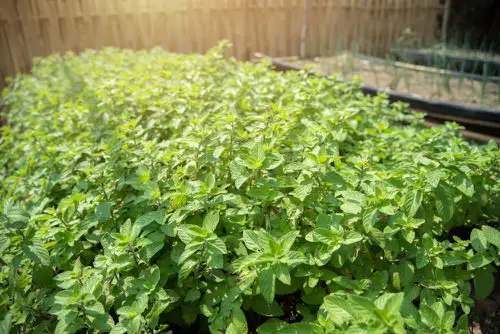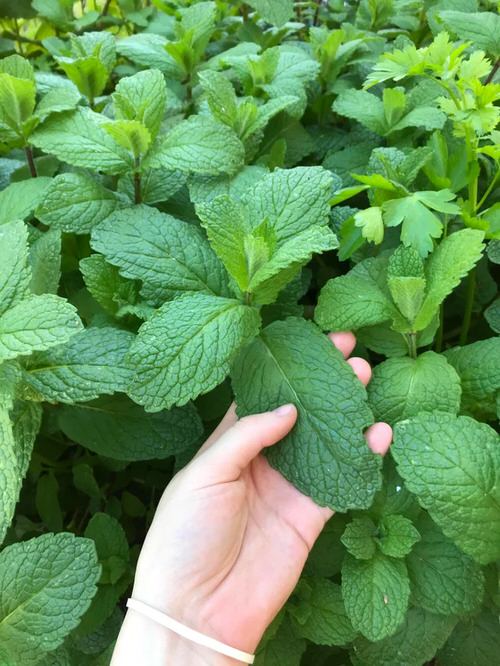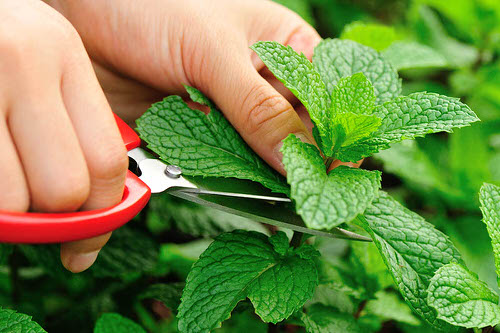Know everything about Planting Mint Bed for Ground Cover to cover the empty space in your garden with this culinary delight!

Of all the herbs, mint is super easy to grow. You don’t need to be an expert on this. It can be grown both in containers and ground. If you want to grow Mint as a fragrant ground cover, follow our guide on Planting Mint Bed for Ground Cover.
Grow Unlimited Supply of Mint With This One Trick
Planting Mint Bed for Ground Cover

Most gardeners prefer to plant mint in containers to save land space as it covers patches aggressively. But if you plant it with precaution, it can become an excellent ground cover. Follow our tried and tested steps:
1. Pick the Right Place
You should start by finding a separate space in your garden for the mint bed. It can be any space, but raised beds that are 5-6 inches in height are perfect.
If you are not growing mint in a raised bed, you’ll need to create a boundary so it doesn’t spread much. Mulch to the rescue – use it for the boundary.
Learn How to Grow Mint in Small Spaces here
2. Choose the Best Spot
Now that you have the bed ready, where to keep it? Pick a weed-free spot, rich with organic content, and compost in soil that receives full sun.
But don’t forget that the spot should get nice afternoon shade. An open, windy area where you can sit by to enjoy the aroma when the wind blows through it. A backyard corner or south-facing balcony/patio will do.
3. Pick the Right Variety
Did you know that Mint has around 2,000 different cultivars that you can find to grow in your garden? You’ll find many popular ones like Peppermint, Wild Mint, Spearmint, and Scotchmint. So which one do you pick?
- For colder parts – peppermint, orange mint, and apple mint are perfect. In cold, plant them in spring.
- For subtropics and tropics – go for pineapple mint and spearmint.
- And if you want a distinct flavor, you can go with chocolate mint and lemon mint.
11 Fragrant Mint Varieties for Herb Garden
4. Growing and Planting
Now that you have all three, you just need to start planting! You can grow mint from cuttings or buy a plant or two from a nursery. Don’t sow the seeds! This will be way faster. Mint is a hardy perennial in USDA Zones 3-11 and comes in varieties for every zone and climate – so choose accordingly.
Once the mint cuttings have matured and developed roots, carefully transplant them into the prepared garden bed.
Caring for the Mint Ground Cover

How to care for your mint as it grows into a lush groundcover? Here are the basics.
Soil
Mint loves rich, moist soil with a pH level of 6-7. You can cover the soil with a little layer of mulch to keep it moist.
Sun
It absolutely adores sunlight. You should grow mint for ground cover in a spot that receives at least 5-6 hours of sunlight every day. But a bit of shade too.
If it doesn’t, you can provide a screen or light shade to allow 12-14 hours of filtered sunlight.
27 Best Types of Mint Varieties to Grow in Garden and Containers
Water
Mint needs regular watering, and the soil needs to be moist at all times. Remember – Wet, not waterlogged.
Spacing
You only need to plant 5-8 mint plants in your space, and it’ll spread quickly. 2-3 feet apart is best.
Pests and Diseases
Mints won’t attract rabbits, rodents, and deer. It is a low-maintenance plant with just a few pests and disease problems.
But be mindful of aphids and spider mites. Also for anthracnose and mint rust diseases.
Additional Tips for Planting Mint as Ground Cover

There are two things you need to keep in mind.
- You should use landscape barriers or borders to restrict Mint from spreading in your garden beyond the desired space.
- Also, add a screen to provide a light shade from the afternoon sunlight to the space where you’re growing it.
Mint Growing Tip: Don’t grow it with other plants! Mint spreads vigorously, and you need to restrict its area. If you plant it in flower beds or vegetable plots – it will soak up all the nutrition from the soil and invade your garden like a weed. We don’t want that, do we?
Growing Mint Indoors and How To Care For It
Harvesting Mint Plants

You can harvest mint leaves at any stage and use them in making mint tea, in salads, with yogurt, and in a lot of cuisines. The quality of the oils that makes mint unique in its flavor is best during the hotter days of summer when the herbs receive 12-14 hours of sunlight every day. Follow this 3-step rule:
- Clip away up to 2/3 of the length of the Mint’s stems.
- Only trim away the number of fresh leaves you need.
- For the best flavor, harvest only before the plant starts to flower. The fragrance is always at its peak at this time.
5 Do’s and Don’ts of Growing Best Mint Ever
Conclusion
You should raise a mint bed in your garden in a confined space; you’ll love its fragrance. If you ask us, go for an herbal lawn of mint (which needs regular mowing), so when you walk over it, the leaves will get crushed and release the scent.


